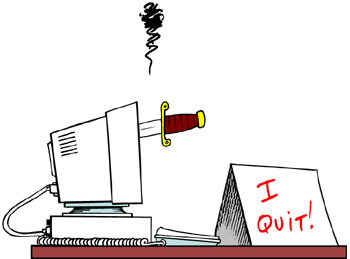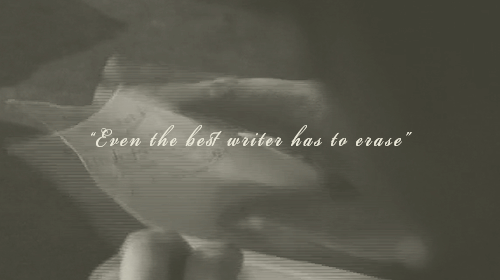
- The chronic busyness that fills our days — prepping classes, grading student work, preparing for meetings, attending meetings, recovering from meetings……. that convinces us we have no time to write;
- The radical (compared to most other jobs) flexibility of our schedules, with sometimes wide expanses of unstructured time that can paradoxically cripple our ability to use much of it for writing (e.g., “I have all summer… My God, where did the time go?!?!?”).
This post from from Jennifer Ahern-Dodson of Duke University, written for the ProfHacker blog (which you should follow regularly — it’s great!), provide some simple yet valuable tips for keeping your writing productive by keeping it scheduled, limited, accountable to others, and kept in mental perspective with humor.
I just helped start a Writers Group for faculty at my college; the participants all seem to agree that having a sense of human connection for fellowship and accountability makes the process less daunting by making it less isolating. While I didn’t have it when I started this particular group, I am going to share with them the Writing Group Starter Kit from the Writing Center at the University of North Carolina – Chapel Hill. It includes worksheets and instructions for making the group experience focused and productive.
Now if I could only follow the advice myself!
_________________________________________________
ProfHacker
Teaching, tech, and productivity.
Scholarly Writing Hacks: 5 Lessons I Learned Writing Every Day in June

[This is a guest post by Jennifer Ahern-Dodson, an assistant professor of the Practice in Writing Studies at Duke University where she teaches digital storytelling and researches learning communities and community-university partnerships. You can follow her on Twitter @jaherndodson.–@JBJ]
On May 31st panic set in. I had agreed to commit to writing every day in the month of June as part of a faculty writing group experiment. Inspired both by National Novel Writing Month (NaNoWriMo), recent conversations about mini-monographs, and a visionary classics colleague who cooked up this idea, seven of us agreed to set a big scholarly writing project goal for the month (such as writing 30,000 words) and write every day to reach it.
We agreed to post our daily word count and to report our progress (and musings) on a private WordPress site: “(Wee) Little Monograph in a Month.” Despite my enthusiasm for the challenge, I feared I’d fail: Could I keep my writing momentum going for a full 30 days? Could I really write just a little every day and get a rough, raggedy draft by the end of the month?
Here’s what I learned from trying.
1. Use writing to figure out what you think. In the early messy-thinking-on-the-page stage, it’s not the quality of the words, but generating text that matters most. Because I committed to writing every day for a month, I was able to turn off the internal critical voice, that perfectionist voice that many writers struggle with, and just write instead of agonizing over every word and sentence. Sometimes my writing meandered for a while before I discovered what it was I wanted to say, but I finished the month with enough of a draft to see both gaps and possibilities. I had something to revise. One of my favorite posts from a fellow traveler in our June group captures the value of generative writing best:
Is anyone else discovering that they might be writing awkward/problematic/vomitatious words but that they are THINKING, and SEEING their project, as if for the first time?
2. 20-30 minutes a day really does make a difference. I’ll admit I was skeptical, but as I settled into the month, I realized that by writing just a little every day, I was making writing a habit. By “showing up” to write daily (whether I felt inspired or not), I discovered myself thinking about my project even after I’d met my daily writing goal, and so found renewed intellectual energy when I showed up to write the next day. Enforcing upper limits on writing time allowed me to walk away and not lapse into the stressful binge-writing trap, a practice that I sometimes fall back on that perversely just generates more resistance to writing at all.
Experimenting with short daily writing also allowed me to do an end run around the problem of (seemingly) unlimited summer writing time (no teaching, committee, administrative commitments), yet never feeling I had enough time to write the first draft of a book.
3. You gotta have a plan, and having a plan means scheduling time for weekly assessments and revisions of the plan and its goals. I revisited my writing goals at the end of each week to keep my big-picture goals in mind (to get that first draft on paper) and to see if I was working productively toward that goal. Each Friday part of my scheduled writing time included these questions:
(Big picture): What was I trying to think about, to understand, to express with this project? To whom? Why? How did the particular section I was working on fit into the big picture?
(Daily writing): How did it go? Did I need to stop and do more research before the next writing session? Was I distracted at that coffee shop? Bored by chapter 3? More productive in the morning? Did I need to schedule writing around vacation or travel?
By planning weekly assessments, I could celebrate small successes when I hit weekly targets, remind myself what it was I wanted to say, and look honestly at what was happening when I was writing, so I could see where I was getting stuck and whether I needed to revise my writing plans to keep the momentum going. Momentum is crucial.
4. Community matters: Showing up for each other helps you show up for your writing. I often resisted writing in June, especially on the weekends and while on a family beach trip. But when I resisted, when I felt I could not write one more word, I turned to our group WordPress site for motivation. Each of us in the June challenge—an historian, philosopher, rhetorician, classicist, German literature scholar, biologist, and Asian and Middle Eastern Studies scholar—posted the highs and lows we encountered with our writing and our research. Despite the disparate topics (including Medieval dogs, ancient foods from the wild, and fan fiction) and meeting only virtually, I felt connected to other writers, which kept me writing. Our group posted word counts daily, which was a helpful accountability measure, but we also infused a sense of fun by posting snapshots of our writing lives with a format adapted from the tumblr siteAcademic Breakfast. Here’s one from a writer studying foraging cultures:
What am I drinking? Glass of Grüner Veltliner (Cheers!)
What am I doing? (5 words) Pre-writing – today’s words till ahead
How am I doing? (10 words) Proving difficult today to tend plants AND write about them.
5. We need to keep a sense of humor about the challenges of writing in the real world.
 Our writing community posted a wide range of experiences (and distractions) that we faced as we tried to write every day in June. Cats taking over our writing spaces. Power outages. Laptop crashes. Big ideas for other projects popping up and distracting us from our June writing project goals. We wrote in airports while waiting for lost luggage, a Disney World bathroom at 5am while family members slept, and in an outdoor garden that called for attention. Our pictures and musings captured our writing lives as we actually lived them, not as we imagined them. Collectively, we demystified the magical summer-of-productive-writing so many of us long for in April, but rarely see materialize by early August. Life happens. Writing can find a way in if we make the space for it.
Our writing community posted a wide range of experiences (and distractions) that we faced as we tried to write every day in June. Cats taking over our writing spaces. Power outages. Laptop crashes. Big ideas for other projects popping up and distracting us from our June writing project goals. We wrote in airports while waiting for lost luggage, a Disney World bathroom at 5am while family members slept, and in an outdoor garden that called for attention. Our pictures and musings captured our writing lives as we actually lived them, not as we imagined them. Collectively, we demystified the magical summer-of-productive-writing so many of us long for in April, but rarely see materialize by early August. Life happens. Writing can find a way in if we make the space for it.
In the end, I managed to write every day in the month of June and sketched out a rough draft of a book that I’d been sitting on for years. Draft in hand, I now turn toward the hard work of revising it. To work productively toward that goal, I know I need a faculty writing community, a writing routine (when the specter of “unlimited” writing time gets replaced by the “no time to write” mantra), and a plan for the academic year.
Our June group is resuming for the fall, and new writers are joining us. We will name and post our writing project goals and weekly targets to our new WordPress site “justwrite.” (My weekly goals will include writing Monday-Friday for at least 20 minutes).We will continue to post pictures of our writing spaces and the joys and challenges of scholarly writing. Our pictures may be less glamorous—beach views and sun porches replaced by offices or classroom spaces—but we will write, and use these scholarly writing hacks to face new kinds of writing resistance with good humor and a shared commitment to cultivating a sane and productive scholarly writing life.
Have you had success with online writing groups? What strategies seemed to help get the writing done? Share in comments!
In-post photos are courtesy of J. Clare Woods. Lead photo is “Writing in the Purple Room” by Flickr user Julie Jordan Scott / Creative Commons licensed BY-2.0








